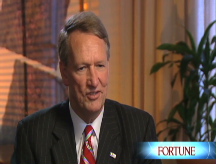High tide at Honda
Patience pays off for the automaker as it thrives in hard times.
 |
| In May, the thrifty Honda Civic became the best-selling vehicle in America. |
NEW YORK (Fortune) -- Given what he has been through in the past several weeks, it is not surprising that General Motors chairman and CEO Rick Wagoner enjoys a bit of schadenfreude at the expense of his Asian rivals.
So while taping an interview with CNNMoney.com last week, Wagoner mischievously tossed barbs at Toyota (TM) for the dubious distinction of being the latest automaker to open a pickup truck plant in North America - only to see truck sales squeezed by the twin pincers of an economic downturn and skyrocketing gasoline prices.
Wagoner was more restrained in his comments about Honda (HMC), however. Japan's second-largest car company makes no body-on-frame pickups, nor any V-8 engines to power them, and so is riding out the current market turmoil with extraordinary ease. Wagoner praised Honda for its thoroughness and consistency in focusing on small, highly-efficient cars and engines.
He might have added "prescience." All but alone among the world's automakers, Honda has long behaved as if the world is indeed running out of all kinds of resources, including oil. Its relentless focus on thrift and conservation, which seemed like eccentricities 20 or 30 years ago, today make Honda the leader of the environmental pack.
At a time when Americans are hyper-conscious about gas prices -- and how can they not be with the media pounding home the message every day - that kind of prescience is paying off for Honda in a big way.
So while the Detroit Three plus Toyota were getting hammered on the showroom floor in May, with sales down anywhere from 4.3% for Toyota to 27.5% for General Motors (GM, Fortune 500), Honda posed a stunning 15.6% sales increase. That was enough to vault it ahead of Chrysler for the month and put it in fourth place in North American sales.
Adding injury to insult, the Honda Civic became the best selling vehicle in America - car or truck - and both it and the Honda Accord outsold the once-invincible Ford F-150 pickup trucks.
Rocket science this isn't. They aren't making any more oil so, over time, you had to figure it was going to get more expensive and more scarce. So why weren't other manufacturers able to see the road ahead as well as Honda?
1. They got sidetracked by the easy profits available in big SUVs and pickups. During the 1990s, the last golden age of the American auto industry, the combination of cheap gas and high-profit big vehicles seduced automakers into believing the good times would never end. Then, when the clock started to run down in 2004, the domestics were too hooked on the big money, and too inflexible by virtue of their UAW contracts, to quickly make changes. Toyota and Nissan (NSANY), anxious for their own bite out of the golden apple, got sucked in too, ramping up pickup production at just the wrong time.
2. Honda's tightly-knit corporate culture and long time horizon made it uniquely able to wait for events to move in its direction, rather than chasing fluctuations in the marketplace. While the car-based Ridgeline truck was savaged by critics for not being a "true" pickup, it now looks like smart move in an era of $4 a gallon gasoline.
3. The other automakers became distracted by their own corporate imperatives. Nissan compounded its problems by starting its own passenger car horsepower race. The Detroit Three, at times, seemed to get their jollies by reviving models from 40 years ago -- Mustang, Challenger, Camaro -- because of the short term jolt they got in the marketplace, rather than formulating any kind of long-term strategy for a resource-constrained world. And who can explain GM's infatuation with Hummers long after the brand ceased to resonate in the marketplace?
The way things area going, don't be surprised to see Honda edge ahead of Ford (F, Fortune 500) into third place in the U.S. market (behind GM and Toyota). It won't happen because of any strenuous sales efforts - it will be another case of the world coming to Honda, rather than the other way around. ![]()
-
 The retail giant tops the Fortune 500 for the second year in a row. Who else made the list? More
The retail giant tops the Fortune 500 for the second year in a row. Who else made the list? More -
 This group of companies is all about social networking to connect with their customers. More
This group of companies is all about social networking to connect with their customers. More -
 The fight over the cholesterol medication is keeping a generic version from hitting the market. More
The fight over the cholesterol medication is keeping a generic version from hitting the market. More -
 Bin Laden may be dead, but the terrorist group he led doesn't need his money. More
Bin Laden may be dead, but the terrorist group he led doesn't need his money. More -
 U.S. real estate might be a mess, but in other parts of the world, home prices are jumping. More
U.S. real estate might be a mess, but in other parts of the world, home prices are jumping. More -
 Libya's output is a fraction of global production, but it's crucial to the nation's economy. More
Libya's output is a fraction of global production, but it's crucial to the nation's economy. More -
 Once rates start to rise, things could get ugly fast for our neighbors to the north. More
Once rates start to rise, things could get ugly fast for our neighbors to the north. More








